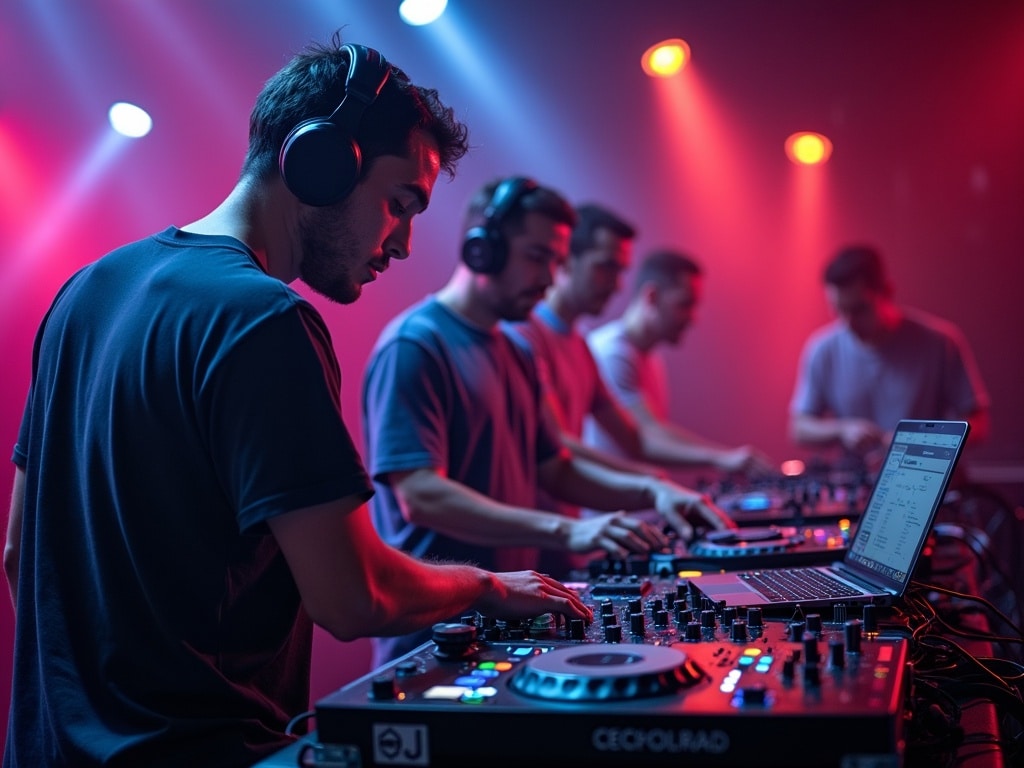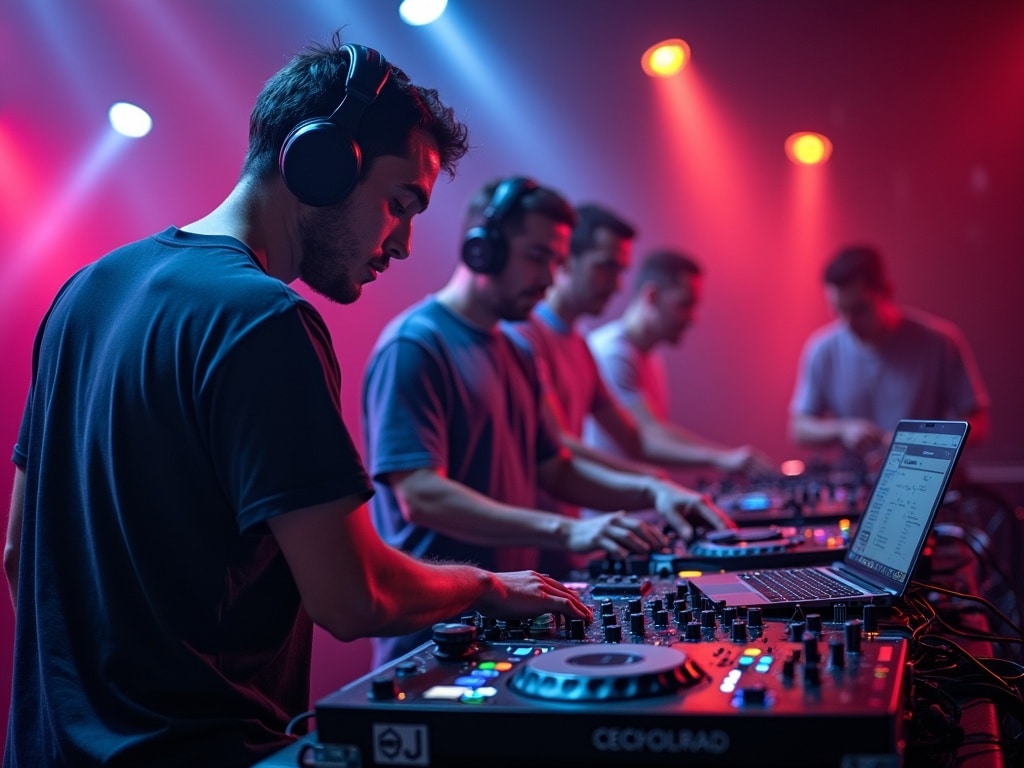DJ Career Advice: From Bedroom Beats to Headlining Gigs
Essential Skills for a Successful DJ Career
Beyond a love for music, a successful DJ needs a diverse skillset. Let’s break down the essentials:
- Technical Proficiency: Mastering the equipment is paramount. This includes understanding DJ controllers, mixers, turntables, and software.
- Music Knowledge: A deep understanding of music theory, genres, and history is crucial for selecting the right tracks and creating engaging mixes.
- Beatmatching: This is the art of seamlessly blending two songs together, ensuring a smooth transition and keeping the energy flowing.
- Mixing Techniques: Fades, EQing, looping, and effects are your tools for shaping the sound and creating unique blends.
- Reading the Crowd: A great DJ knows how to assess the audience's mood and adjust the music accordingly, creating a shared experience.
Don't be afraid to experiment and constantly refine your skills. The more tools you have at your disposal, the more versatile and in-demand you'll become.
Building a Strong DJ Brand and Online Presence
In today’s digital age, your online presence is just as important as your DJing skills. Here’s how to build a strong brand:
- Define Your Niche: What kind of music do you specialize in? What makes you unique? Defining your niche helps you attract a specific audience.
- Create a Professional Website: Your website is your digital storefront. Showcase your mixes, bio, upcoming gigs, and contact information.
- Engage on Social Media: Use platforms like Instagram, Facebook, and TikTok to share your mixes, promote your gigs, and connect with fans.
- High-Quality Content: Invest in professional photos and videos. They make a huge difference in perceived value.
- Consistent Branding: Use the same logo, colors, and fonts across all your platforms to create a cohesive brand identity.
Remember, your brand is more than just a logo. It’s your reputation, your style, and the unique experience you offer. Keep it authentic and consistent.
Essential DJ Equipment and Costs
Getting started doesn't require breaking the bank, but you'll need some essential gear:
- DJ Controller: A versatile tool that emulates turntables and mixers, often bundled with DJ software. (Cost: $200 - $1000+)
- DJ Software: Programs like Serato DJ Pro, Traktor Pro, and Rekordbox DJ allow you to organize and mix your music digitally. (Cost: $0 - $300+)
- Headphones: High-quality headphones are essential for beatmatching and monitoring your mix. (Cost: $50 - $300+)
- Speakers: For practicing and smaller gigs, you'll need a pair of monitor speakers. (Cost: $100 - $500+)
- Laptop: A reliable laptop is crucial for running your DJ software and storing your music library. (Cost: Varies)
Consider starting with used equipment to save money. As you progress, you can upgrade to more advanced gear.
Finding and Securing DJ Gigs
Landing your first gigs requires hustle and networking:
- Start Small: Offer to DJ at house parties, local bars, or community events to gain experience.
- Create a Demo Mix: Showcase your skills with a well-produced mix that highlights your style and musical taste.
- Network: Attend local DJ events, meet promoters, and connect with other artists.
- Be Persistent: Don't be discouraged by rejections. Keep reaching out and showcasing your talent.
- Online Platforms: Utilize online platforms designed to connect DJs with gig opportunities.
Remember, every gig is an opportunity to impress potential clients and expand your network. Treat each performance with professionalism and enthusiasm.
Networking for DJs: Connecting with the Right People
Networking is more than just handing out business cards. It's about building genuine relationships:
- Attend Industry Events: Conferences, workshops, and DJ competitions are great places to meet promoters, venue owners, and other DJs.
- Support Other Artists: Go to their gigs, share their music, and offer genuine support.
- Engage Online: Interact with promoters and venues on social media. Show them you're interested and engaged.
- Follow Up: After meeting someone, send a personalized email or message to stay connected.
- Be Authentic: People can spot insincerity. Be genuine, respectful, and enthusiastic.
Remember that networking is a two-way street. Offer value to others and build mutually beneficial relationships.
Creating Engaging DJ Mixes and Performances
A technically sound mix is important, but an engaging performance is what truly captivates the audience:
- Plan Your Set: Choose your songs carefully and create a playlist that builds energy and tells a story.
- Use Transitions Creatively: Experiment with different mixing techniques to create seamless and interesting transitions.
- Interact with the Crowd: Use the microphone to engage with the audience, build excitement, and create a connection.
- Read the Room: Be prepared to adjust your set based on the audience's reaction and energy levels.
- Don’t Be Afraid to Improvise: Some of the best DJ moments come from spontaneous decisions.
Practice makes perfect. Record your sets and listen back to identify areas for improvement.
Music Licensing and Legal Considerations
Understanding music licensing is crucial to avoid legal issues:
- Performance Rights: When playing music in public, you need to obtain performance rights licenses from organizations like ASCAP, BMI, and SESAC.
- Copyright Law: Be aware of copyright laws and avoid using unauthorized remixes or samples.
- Streaming Services: If you’re streaming your sets online, make sure you have the necessary licenses.
- Fair Use: Understand the concept of fair use, which allows limited use of copyrighted material for commentary, criticism, or education.
- Seek Legal Advice: When in doubt, consult with a lawyer specializing in music law.
Ignoring music licensing can lead to hefty fines and legal trouble. Protect yourself by understanding and complying with the law.
Managing Finances and Building a Sustainable DJ Career
Treat your DJing like a business:

- Track Your Income and Expenses: Use accounting software or a spreadsheet to track your earnings and expenses.
- Set Your Rates: Research the going rates for DJs in your area and set your prices accordingly.
- Save for Taxes: As a freelancer, you're responsible for paying your own taxes. Set aside a percentage of your income for this purpose.
- Invest in Your Career: Allocate funds for marketing, equipment upgrades, and professional development.
- Diversify Your Income: Explore opportunities like teaching DJing, producing music, or hosting events.
Financial planning is key to building a sustainable and successful DJ career.
Adapting to Different Music Genres and Audiences
Versatility is a valuable asset for a DJ:
- Be Open-minded: Explore different genres beyond your comfort zone.
- Research Your Audience: Before each gig, learn about the demographics and musical preferences of the audience.
- Adapt Your Style: Be prepared to adjust your set based on the specific event and audience.
- Don't Be Afraid to Experiment: Try incorporating new genres and styles into your mixes, but do it tastefully.
- Practice Transitions: Master transitions between different genres to create seamless and engaging mixes.
The more adaptable you are, the more opportunities will come your way.
Overcoming Stage Fright and Performing Confidently
Nerves are normal, but they don't have to control you:
- Prepare Thoroughly: The more prepared you are, the more confident you'll feel.
- Visualize Success: Imagine yourself delivering a killer set and connecting with the audience.
- Focus on the Music: Let the music guide you and forget about your worries.
- Connect with the Audience: Make eye contact, smile, and engage with the crowd.
- Practice Deep Breathing: Take slow, deep breaths to calm your nerves before and during your set.
Remember, the audience is there to have fun. Embrace the energy and enjoy the experience.
Advanced DJ Techniques and Software Tutorials
Mastering advanced techniques can elevate your DJing to the next level:
- Scratching: Learn basic and advanced scratching techniques to add flair and creativity to your mixes.
- Beatmatching: Refine your beatmatching skills for seamless and undetectable transitions.
- Harmonic Mixing: Learn how to mix songs in compatible keys to create harmonious blends and avoid clashing sounds.
- Effects: Experiment with different effects like reverb, delay, and flanger to add depth and texture to your mixes.
- Software Tutorials: Explore online tutorials and workshops to learn advanced features of your DJ software.
Continuous learning is essential for staying ahead of the curve and pushing your creative boundaries.
The Power of Social Media in Promoting Your DJ Career
Social media is your digital megaphone:
- Consistent Posting: Maintain a regular posting schedule to keep your audience engaged.
- Engaging Content: Share mixes, videos, photos, and behind-the-scenes content.
- Use Hashtags: Use relevant hashtags to reach a wider audience.
- Interact with Followers: Respond to comments and messages promptly.
- Run Contests and Giveaways: Encourage engagement and grow your following.
Social media is a powerful tool for building your brand, connecting with fans, and promoting your gigs. Use it wisely.
Handling Difficult Situations and Requests While DJing Live
Prepare for the unexpected:
- Stay Calm: Don't panic in stressful situations. Take a deep breath and assess the situation logically.
- Be Assertive: Politely decline inappropriate requests.
- Handle Hecklers Professionally: Don't engage in arguments. Ignore or defuse the situation calmly.
- Technical Issues: Have a backup plan in case of equipment malfunctions.
- Communicate Clearly: Let the venue staff know if you need assistance with anything.
Handling difficult situations with grace and professionalism will earn you respect and build your reputation.
Developing a Unique DJ Style and Sound
Stand out from the crowd:
- Experiment: Don't be afraid to try new things and push boundaries.
- Embrace Your Influences: Draw inspiration from your favorite artists, but don't copy them.
- Focus on Your Strengths: Identify what you do well and build on those strengths.
- Seek Feedback: Ask other DJs and musicians for constructive criticism.
- Be Patient: Developing a unique style takes time and effort.
Your unique style is what will set you apart and attract a loyal following.
Advice for DJs of All Ages: Overcoming Challenges and Staying Motivated
The journey of a DJ is a marathon, not a sprint:
- Set Realistic Goals: Break down your goals into smaller, achievable steps.
- Celebrate Your Successes: Acknowledge and appreciate your accomplishments along the way.
- Don't Compare Yourself to Others: Focus on your own progress and journey.
- Stay Passionate: Remember why you started DJing in the first place.
- Seek Support: Connect with other DJs and musicians for encouragement and advice.
No matter your age or experience level, staying motivated and persistent is essential for achieving your DJ career goals. Keep learning, keep growing, and never stop chasing your dreams.

